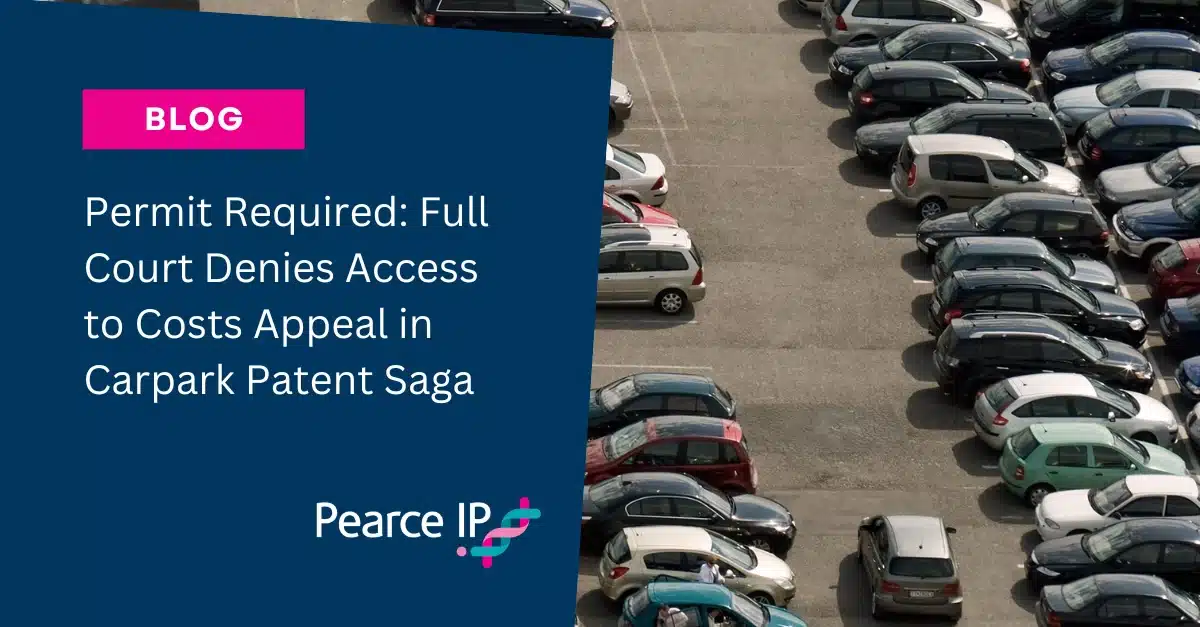| Date of decision: | 4 December 2024 |
| Body: | Full Court of the Federal Court of Australia |
| Adjudicator: | Justices Perram, Downes and O’Sullivan |
Highlight
The Full Federal Court has refused leave to appeal from costs orders made following the successful appeal in the long-running dispute between Vehicle Monitoring Systems (VMS), and SARB Management Group (SARB) and the City of Melbourne (CoM), over parking sensor technology. The decision provides important guidance on costs appeals, particularly regarding the broad discretion that trial judges have on the issue of costs.
Background
As previously reported, in 2024, the Full Federal Court overturned aspects of the primary judge’s decision regarding construction and infringement of VMS’ patents for parking overstay detection systems. This led the Full Court to overturn the primary judge’s infringement finding with respect to PinForce version 3.
Following that decision, the question of whether the original costs orders should be varied was remitted to the primary judge. The primary judge subsequently vacated the original costs orders, and ordered that VMS was liable:
- on a party/party basis for SARB’s and CoM’s costs on the infringement claim before their respective Calderbank offers (made in March 2021); and
- on an indemnity basis for SARB’s and CoM’s costs on the infringement claim and invalidity cross-claim thereafter.
The primary judge also ordered SARB to pay VMS’ costs on a party/party basis on the invalidity cross-claim before March 2021.
VMS subsequently sought leave to appeal these varied costs orders to the Full Court.
Consideration
Costs pre-Calderbank offers
VMS had sought a percentage-based costs order reflecting its partial success on infringement (it succeed on infringement with respect to Pinforce versions 1 and 2 but not 3). However, the Full Court agreed with the primary judge’s approach which focused on the “dominant feature of the application”, being the failed infringement claim with respect to PinForce version 3. The Full Court noted that the primary judge was best placed to characterise the ‘dominant feature’ of the liability trial, and his Honour’s approach of awarding the infringement claim costs to SARB and invalidity cross-claim costs to VMS “reflected that neither party had enjoyed general success in relation to its claim against the other”.
The Full Court emphasised that judges:
- have absolute discretion in costs matters (though the discretion must be exercised judicially);
- are not required to alert the parties to their intended costs orders or seek further submissions about the proposed form of order;
- are not bound to adopt one or other of a party’s contentions; and
- may arrive at their own view by making adjustments, even where there is commonality between the costs orders sought by the parties to the dispute.
The Full Court also dismissed VMS’ submissions that the primary judge had failed to give sufficient weight or consideration to various matters, including VMS’ partial success (which was in fact explicitly addressed in the judgment) and certain aspects of the CoM’s conduct in the proceedings. In any case, the Full Court noted that silence on particular submissions in a judgment does not necessarily indicate that they were not considered and given appropriate weight.
Costs post-Calderbank offers
The Full Court noted that VMS repeated many of its submissions to the primary judge regarding the Calderbank offers in its application for leave to appeal, including that:
(i) the CoM’s Calderbank offer was not capable of being accepted if SARB’s Calderbank offer was rejected. In those circumstances, the two offers must be considered together;
(ii) VMS achieved a better result than the offers because it succeeded on additional damages against SARB for Pinforce versions 1 and 2;
(iii) VMS was not able to commercially assess the significance of abandoning its claim in relation to PinForce version 3 due to its officers being refused access to information on the volumes and dates of supply of PinForce versions 1, 2 and 3; and
(iv) SARB’s offer did not explicitly provide for the dismissal of the invalidity cross-claim.
The Full Court rejected VMS’ arguments, deferring to the primary judge’s reasoning on these submissions. The Full Court noted that the primary judge did in fact consider the interplay between the two offers and so took into account the contingent nature of the offer by the CoM. The Full Court also relied upon the primary judge’s finding that VMS’ claim for additional damages was unlikely to exceed SARB’s offer as to costs and that VMS’ rejection was unreasonable, noting that the primary judge was best placed to make such an evaluative judgment.
Regarding VMS’ ability to commercially assess the significance of abandoning its PinForce version 3 claim, the Full Court noted that VMS’ lawyers had access to the relevant confidential information, making it unnecessary for VMS’ officers to have direct access for this purpose. The Full Court also found that VMS’ submission that SARB’s offer did not explicitly provide for dismissal of the invalidity cross-claim ignored the clear meaning of the sentence in the offer, being “for the purposes of settling these proceedings, our client accepts the validity of the two patents in suit”.
Outcome and Implications
The Full Court refused to grant leave to appeal the costs orders, finding no sufficient doubt in the primary judge’s reasons to warrant reconsideration. The Full Court went further, noting that even if VMS had successfully demonstrated error in the primary judge’s reasoning, the Full Court would still have arrived at the same costs orders.
The Full Court’s decision confirms the broad discretion trial judges have in making costs orders which leads to costs orders seldomly being overturned on appeal.
About Pearce IP
Pearce IP is a boutique firm offering intellectual property specialist lawyers, patent attorneys and trade mark attorneys to the life sciences industries (in particular, pharmaceutical, biopharmaceutical, biotech, ag-tech and food tech). Pearce IP is the 2021 ‘Intellectual Property Team of the Year’ (Lawyers Weekly Australian Law Awards) and was shortlisted for the same award in 2022. Pearce IP is ranked in IAM Patent 1000 and Managing IP (MIP) IP Stars, in Australasian Lawyer 5 Star Awards as a ‘5 Star’ firm, and the Legal 500 APAC Guide for Intellectual Property.
Our leaders have been recognised in virtually every notable IP listing for their legal, patent and trade mark excellence including: IAM Patent 1000, IAM Strategy 300, MIP IP Stars, Doyles Guide, WIPR Leaders, 5 Star IP Lawyers, Best Lawyers, and Australasian Lawyer 5 Star Awards, and have been honoured with many awards including Australian Law Awards – IP Partner of the Year, Women in Law Awards – Partner of the Year, Women in Business Law Awards - Patent Lawyer of the Year (Asia Pacific), Most Influential Lawyers (Changemaker), among other awards.

Naomi Pearce
CEO, Executive Lawyer (AU, NZ), Patent Attorney (AU, NZ) & Trade Mark Attorney (AU)
Naomi is the founder of Pearce IP, and is one of Australia’s leading IP practitioners. Naomi is a market leading, strategic, commercially astute, patent lawyer, patent attorney and trade mark attorney, with over 25 years’ experience, and a background in molecular biology/biochemistry. Ranked in virtually every notable legal directory, highly regarded by peers and clients, with a background in molecular biology, Naomi is renown for her successful and elegant IP/legal strategies.
Among other awards, Naomi is ranked in Chambers, IAM Patent 1000, IAM Strategy 300, is a MIP “Patent Star”, and is recognised as a WIPR Leader for patents and trade marks. Naomi is the 2023 Lawyers Weekly “IP Partner of the Year”, the 2022 Lexology client choice award recipient for Life Sciences, the 2022 Asia Pacific Women in Business Law “Patent Lawyer of the Year” and the 2021 Lawyers Weekly Women in Law SME “Partner of the Year”. Naomi is the founder of Pearce IP, which commenced in 2017 and won 2021 “IP Team of the Year” at the Australian Law Awards.

Helen Macpherson
Executive, Lawyer (Head of Litigation –Australia)
Helen has over 25 years’ experience as an intellectual property specialist and is recognised as an industry leader. Helen advises on all forms of intellectual property including patents, plant breeder’s rights, trade marks, copyright and confidential information.
Throughout her career, Helen has maintained a strong focus on high-value patent mandates involving complex technologies. In these mandates, Helen has been able to draw upon her technical training in biochemistry and molecular biology, as well as her ability to up-skill swiftly in relation to diverse technologies. Helen’s patent work has encompassed the technical fields of inorganic, organic, physical and process chemistry, biochemistry, biotechnology (including genetics, molecular biology and virology) and physics.
Helen is a member of the Intellectual Property Committee of the Law Council of Australia, as well as a member of the Intellectual Property Society of Australia and New Zealand.

Nathan Kan
Lawyer
Nathan is a lawyer focused on providing legal services and advice to life sciences clients, with a focus on litigation support regarding intellectual property (patents, trade marks, designs, copyright, domain names, plant breeders rights and confidential information) and commercial disputes.
Nathan is passionate about the intersection of law and science. Whilst serving as Sponsorship Director and subsequently as Vice President of the Science and Technology Law Association (SATLA) at the University of Melbourne, he led various engagement events, workshops and publications covering a range of STEM fields, including life sciences, artificial intelligence and digital transformation.

